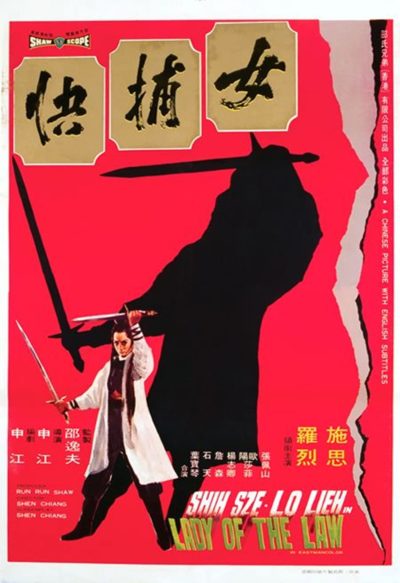★★★
“I am the law…”
 I kept moving between 2½ and 3 stars for this. It is pretty chatty, and the focus is not as much on the title character as I might have hoped. But there’s no denying that Leng (Shi) is a very solid character, and when she gets her chances to shine, does so in a memorable fashion. This is nowhere better illustrated than her final battle, where she takes on an enemy – who just tried to molest Leng, believing her drugged – while they both balance on a tight-rope. There’s no particular reason for the fight to take place in such an environment. The ground would have been perfectly fine. But it adds an extra dimension, and the way it’s filmed makes it feel surprisingly possible that they were wobbling about up there.
I kept moving between 2½ and 3 stars for this. It is pretty chatty, and the focus is not as much on the title character as I might have hoped. But there’s no denying that Leng (Shi) is a very solid character, and when she gets her chances to shine, does so in a memorable fashion. This is nowhere better illustrated than her final battle, where she takes on an enemy – who just tried to molest Leng, believing her drugged – while they both balance on a tight-rope. There’s no particular reason for the fight to take place in such an environment. The ground would have been perfectly fine. But it adds an extra dimension, and the way it’s filmed makes it feel surprisingly possible that they were wobbling about up there.
To get there is, however, quite a process. There’s a rapist going about China, but when he eventually escalates to murdering the concubine of a high official, something must be done. That something is Leng, a smart and persistent officer of the law. However, the real rapist, Chen (Shek), and his rich father frame Jiao (Lo) for the crime; he flees, with Leng in pursuit. The Chens seek to make sure Jiao can’t testify. They also seek to sideline and silence an incriminating witness – a blind man who can identify the rapist by his voice. As a result, he could both exonerate Jiao and pin blame on the real culprit.
Once this gets going, it is, however, mostly a pursuit, with Leng tracking Jiao across the countryside. The best sequence likely has him hiding out in a palace whose owner has a massive harem of Warrior concubines. They’re… quite pleased by Jiao’s arrival, but their owner refuses to help Leng in her quest, unless she can defeat the entire harem. It’s a nicely staged sequence, which must have required Shaw Brothers to hire just about every woman at the time in Hong Kong, who knew how to operate the business end of a sword. On the other hand, Lo is top-billed for a reason, and definitely gets a good slab of screen time, despite the title of the movie.
There’s even a prologue where we discover the same men who framed him was responsible for the death of his father, and the child Jiao was only saved by the intervention of the child Leng. This doesn’t add much to proceedings, and can safely be ignored. The same goes for Jiao’s secret mastery of the Flaming Daggers technique: demonstrated, the completely forgotten. I’d rather have seen the time used to develop Leng’s story, such as the intriguing relationship with her white eyebrowed, Taoist mother. Shih apparently took over at Shaw Brothers as their star, after Cheng Pei Pei moved to California in the early seventies. This, which I’ve read sat on the shelf for several years, is the first film of hers I’ve seen (outside of bizarre Shaw/Hammer co-production, The Legend of the 7 Golden Vampires). However, there was enough here to make me interested in finding some of her other work.
Dir: Siu Wing
Star: Shih Szu, Lo Lieh, Chang Pei-Shan, Dean Shek




